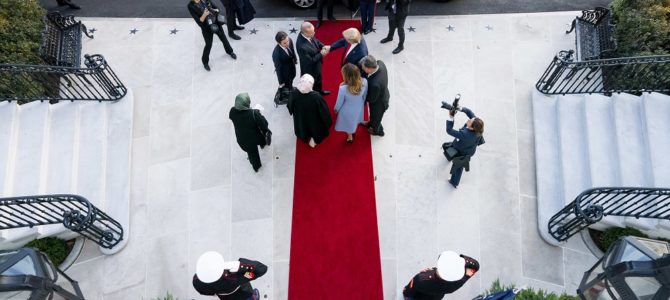
Earlier this week, French President Emmanuel Macron said Turkey was “playing a dangerous game” in Libya, citing it as further evidence of the North Atlantic Treaty Organization’s “brain death.”
For some time now, Turkey has been working counter to the interests of its NATO allies, fomenting unrest and instability in global hotspots such as Syria, Iraq, and more recently Libya, whilst cosying up to Iran. It has become a major threat to the organization’s very reason for being, contradicting its “one for all and all for one” ethos.
NATO was founded to instil military cooperation and stability into a world fractured and broken by war. Theoretically, its members are bound by a common pursuit of a “peaceful resolution of disputes” and seeking to avoid the exacerbation of conflicts through reckless, unilateral action. Under the authoritarian and increasingly anti-Western rule of Muslim Brother Recep Erdogan, Turkey in recent years has taken military and foreign policy steps that starkly contrast these basic NATO principles.
Only last month, France and Turkey were involved in an incident in the Eastern Mediterranean. France wanted to determine whether Turkey’s frigates were smuggling arms to Libya, in violation of a United Nations (UN) embargo. This met hostility, aggression, and a lack of cooperation. In the grand scheme of things, this is a relatively minor incident, but it is symptomatic of Turkey’s increasingly belligerent view towards its NATO allies and points to the increasingly hostile role it is playing in Libya.
In January at a much-heralded conference in Berlin, Turkey and other foreign powers signed a UN agreement to cease sending arms into Libya. Yet a BBC Africa investigation found that a Turkish ship, the Bana, had delivered military-escorted arms shipments to the port of Tripoli mere days later. This reveals an insincerity in Ankara’s commitment to de-escalate the conflict that is staggering even by their duplicitous foreign policy standards.
The Berlin agreement was driven by many of NATO’s key members, such as France and Italy, reflecting the organisation’s recognition that an influx of arms benefits no one except the extremist militias and smugglers propping up the Tripoli-based government. Turkey now appears to be using the leverage gained from sustained, illegal arms shipments to embed itself in Libya’s economic future, with reports suggesting they’ve made direct threats to Italy’s gas supply as part of that process.
Ankara calculates that tipping the tide in favor of Fayez el-Sarraj’s Government of National Accord will see Turkey wield unprecedented economic influence in post-conflict Libya, whatever the cost in blood and treasure. This strategy is not only rendering it complicit in the continuing destruction and loss of life the civil war brings, but sees it trampling and acting in direct contradiction of its NATO allies, particularly Italy and France.
Beyond Libya, Turkey has increasingly aligned with NATO’s principal adversaries, Iran and Russia, forming an unholy triumvirate that seeks to loosen the rules-based international system. At the start of the year, President Trump rightly called on NATO to take a more proactive role in facing down the network of terror and destabilisation Tehran has built across the Middle East. Before Covid-19 brought the world to a standstill, the rest of the organization was increasingly falling in behind President Trump’s tougher stance.
Yet Turkey has spent years working counter to these efforts, instead cosying up to Iran, weakening NATO’s stance in the process. This has allowed Tehran to see an organisation divided, rather than a united front willing to take on its destructive influence. This, combined with their increasingly reckless actions regarding Libya, shows a Turkey that holds no regard for NATO’s interests and priority.
Turkey has spent millions on questionable lobbying campaigns—sometimes on behalf of the government, sometimes on behalf of quasi-state institutions—all aimed at diverting attention and hiding its duplicity. Increasingly, thanks to investigations such as that tied to Michael Flynn, or Turkey’s attempts to exert control over Libya, Turkey’s duplicitous behaviour towards the United States is coming to light. It poses no strategic value if it undercuts U.S. interests at every turn.
Like other countries that actively work against the strategic aims of NATO and its honourable members, Turkey needs to be called out. NATO has long, and rightly, known it has a “Turkey problem,” but it is now clear that all other avenues for resolving it are closed. Only through expelling Turkey can NATO truly create the united front it needs to take on the world’s gravest security threats.









